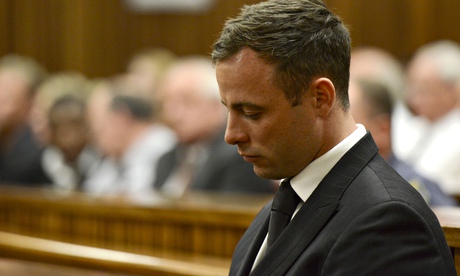
There has never been a criminal trial like it. From the moment Oscar Pistorius, the sci-fi athlete, shot and killed his model girlfriend, Reeva Steenkamp, on the morning of Valentine’s Day in 2013, it became irresistible rolling news. For the first time in South African history, a trial would be shown, from opening statements to verdict, on live TV. A cable channel soon offered 24-hour coverage and analysis. And, unlike the OJ Simpson case in 1995, social media stepped in with round-the-clock bloviating by everyone from experts to Donald Trump. June Steenkamp, Reeva’s mother, remembers that as Pistorius took the witness stand there was rapt silence in the courtroom; the only sound was journalists tapping on their screens.
Part of the appeal was superficial: Pistorius, handsome and charismatic, and Steenkamp, an FHM cover star and aspiring reality-TV star, were a glam couple (though only of three months’ standing) and her demise suggested perhaps a jealous crime of passion. But there was deeper intrigue, too: the case prompted discussion of the astonishing murder rate in South Africa, and particularly what appeared to be a culture of acceptance of violence by men against wives and girlfriends. What really fuelled debate, and charged our imaginations, however, was that, for all the phone records and Whatsapp messages the court trawled through, Pistorius alone knew whether he actually meant to kill Steenkamp.
This unknown – and the complexity of separating the signal from a year-and-a-half’s noise – makes the Pistorius-Steenkamp story a compelling one for book treatment. Publishers seem to agree. First out of the blocks, in September, was Oscar: an Accident Waiting to Happen (Kindle only), co-written by Patricia Taylor, whose daughter Sam dated Pistorius for two (apparently) tumultuous years. Now, with the benefit of a few weeks’ further reflection, there are three more.Behind the Door by Mandy Weiner and Barry Bateman (Macmillan, 576pp, £16.99) could confidently claim to be the most comprehensive account of the trial. At 550-plus pages of dense print, including a grisly photo section and floorplan of Pistorius’s bedroom and bathroom, it is doggedly ordered and authoritative. Parts are satisfyingly encyclopaedic, but at times the detail is distracting: when Pistorius shoots Steenkamp, the narrative power dissipates in a fiddly discussion of the dark-wood magazine rack “packed with glossy titles” next to the toilet, or the aluminium and glass stand outside that showcased more than 40 pairs of Oakley sunglasses.
Bateman, a broadcaster for South Africa’s Eyewitness News, acknowledges that he leans towards “dry, hard-fact accounts of events”, and credits Weiner, his colleague and the author of a book on Johannesburg’s underworld, with softening that impulse. Still, Behind the Door might have benefited from more style, less substance.
The strongest of the accounts in this respect – and the best at supplying a context for what unfolded – is John Carlin’s Chase Your Shadow: the Trials of Oscar Pistorius (Atlantic, 384pp, £17.99). Carlin, a fine journalist, is clearly aware of the filmic potential of the tale; apparently, he was nudged to write the book by Paul Greengrass, director of the Bourne films. Carlin has previous here, too – his book Playing the Enemy: Nelson Mandela and the Game that Made a Nation was turned into Invictus by Clint Eastwood – and his recreation of that Valentine’s Day morning has the pace and energy of a movie script earmarked for, say, Channing Tatum and Jennifer Lawrence.
Carlin makes a smart, convincing case that there are “two Oscars” and that, in this respect, Pistorius is a faithful reflection of South Africa in 2014, a country that is the “undisputed global champion” of rape and violent crime against women and where 45 people are murdered every day. “There were two South Africas,” Carlin concludes. “One was uplifting; the other was frightening. One was made up of people who were unusually polite, who were generous, indomitable, forgiving and brave; the other of people who were reckless, volatile, violent, hot-headed.”
What neither book offers is a view on Pistorius’s innocence or guilt. This is left to June Steenkamp in Reeva: A Mother’s Story (Sphere, 288pp, £14.99). The Steenkamps have not always been sympathetically portrayed in the media, maybe because they have demanded money for interviews. (The family still struggles financially: shortly before she died, Reeva transferred £60 to her parents so they could watch her new reality show on cable TV.)
But June Steenkamp’s book is no lightweight, hastily conceived cash-in but a forthright and endearingly honest account. Early on, she raises the possibility that the couple had a terrible row and he violently lost his temper, “because he shot her not just once, but bang, bang, bang, bang with 9mm bullets until she was dead”. June Steenkamp claims not to hate Pistorius; she barely knows him. She spoke to him just once: one day, Reeva called from the car as Pistorius drove at 160mph and her mother, a tough Lancastrian, scolded him, “If you hurt my baby, I’ll have you wiped out.”
When Pistorius testified, June Steenkamp sat forward in her seat, eager and, she says, open-minded to see if he could convince her. It didn’t happen. Pistorius will have another chance to display contrition when he publishes his own book, which, predictably, his agent has announced is already taking shape.
Click here to buy Behind the Door for £12.99; Chase Your Shadow for £14.39; or Reeva for £11.99 from the Guardian Bookshop

